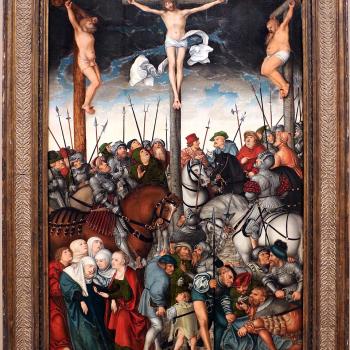We blogged about the controversy over the “Filoque” phrase in the Nicene Creed, the confession that the Holy Spirit proceeds “from the Father and the Son.” The original text said that the Holy Spirit proceeds from the Father, with the “and the Son” being added by the Pope in 1014. This apparent usurpation of an authoritative church council was a major factor in the Eastern church breaking away from the Western church in the “Great Schism,” which divided Christendom into Western “Catholics” and Eastern “Orthodox.”
Now the Lutheran World Federation, in its talks with the Orthodox, is recommending that member churches (which do not include confessional Lutherans such as the LCMS, WELS, and ELS) drop the “and the Son” from the Nicene Creed.
In the post, we maintained that the “and the Son” is Biblical, so there is nothing wrong with including the Filioque in the Creed, though there is nothing wrong with dropping it either.
But there are other differences from the original creed as formulated by the Councils of Nicaea and Constantinople that also deserve our consideration.
Our version of the creed begins: “I believe in one God, the Father Almighty, maker of heaven and earth and of all things visible and invisible.” It goes on to say, “And in one Lord, Jesus Christ,” then going into detail about Him. Concluding, “And I believe in the Holy Spirit, the Lord and giver of life.”
The original Nicene Creed didn’t say “I believe.” Rather, it said, “We believe.” “We believe in one God, the Father Almighty, maker of heaven and earth. . . .And we believe in the Holy Spirit, the Lord and giver of life.” Do you see the difference?
The Apostle’s Creed, on the other hand, does say “I believe.” As it was explained to me, the Apostle’s Creed is a baptism confession. Thus, the individual is making a profession of faith. This is why the Apostle’s Creed is used in catechesis to instruct adults in preparation for their baptism and for confirmation for those who were baptized as children and are now taking on the baptismal vows as their own.
The Nicene Creed, though, is a church confession. It is what the church as a whole, including all of the individuals within it, believes and teaches. It represents a collective doctrinal agreement on the Trinity and the Incarnation of Christ.
The reason the creed got shifted to the first person singular is that the Latin translation of the original Greek used “Credo” (I believe). So this became the version used by Catholics and other Western Christians after the Reformation.
But the Eastern Orthodox churches, for whom Greek was their liturgical language as Latin was the Catholics, made a new Greek translation from the original Greek that also used the first person singular (from Πιστεύομεν to Πιστεύω). This is surprising, since the Orthodox are usually sticklers for the original Greek and especially for texts approved by the Ecumenical Church Councils (remember “filioque”). But they also say “I believe” rather than the conciliar “We believe.”
If we use the first person plural pronoun (“we”), we are including the first person singular pronoun (“I”). And if everyone in a church body is saying “I believe,” that amounts to a “we believe.” Still, I think it would be better to return to the original terminology of the Council of Nicaea, “we believe” and keep the distinction between an individual profession of faith and a collective doctrinal confession. Some church bodies, Eastern and Protestant, do use the plural. On the other hand, perhaps it would be better to keep this rare case of Roman, Orthodox, and Protestant Catholicity, even though it is based on a mistake.
Speaking of Catholicity, we Missouri Synod Lutherans are just about the only ones who say “I believe [vs. ‘we believe’] in one holy Christian and apostolic Church” instead of the original “one holy catholic and apostolic church.”
The original Greek word is Καθολικὴν, which the Latin simply transliterates instead of translates, giving us “catholic.” I am aware that the old German translation used “Christian” even before the Reformation, so that’s the reason given for the German Lutherans rendering it the same way, even when translating their liturgy and confessions into English.
But “Christian” is not a good translation of “catholic” into English, which is the language we are using here. I am, however, sympathetic to the complaint from the pews that we don’t want to sound like we are confessing Roman Catholicism. So why don’t we translate the Greek and Latin word “catholic”? If Καθολικὴν and “catholic” mean “universal,” why not say, “We believe in one holy universal and apostolic church”?
UPDATE: I see that the Wisconsin Synod uses “we,” but “Christian” rather than “Catholic.” ELCA uses both “we” and “catholic.” The ELS uses the same text with “I” and “Christian church” as the LCMS.
Illustration: Icon depicting Constantine the Great, accompanied by the bishops of the First Council of Nicaea (325), holding the Niceno-Constantinopolitan Creed of 381. First line of main text in Greek: Πιστεύω εἰς ἕνα Θ[εό]ν, πατέρα παντοκράτορα, ποιητὴν οὐρανοῦ κ[αὶ] γῆς,. Translation: “I believe in one God, the Father the Almighty, Maker of heaven and earth.” By Unknown author – http://home.scarlet.be, http://home.scarlet.be, Public Domain, https://commons.wikimedia.org/w/index.php?curid=117976
[Notice that the version held up in this Orthodox icon is “I believe.”]











